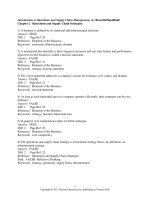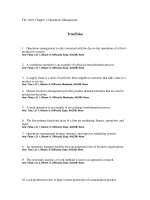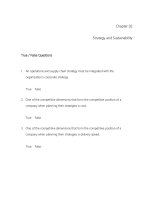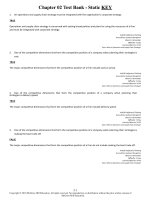Lecture Operations and supply chain management: The Core (3/e) – Chapter 5: Projects
Bạn đang xem bản rút gọn của tài liệu. Xem và tải ngay bản đầy đủ của tài liệu tại đây (823.56 KB, 15 trang )
Projects
Chapter 05
McGrawHill/Irwin
Copyright © 2013 by The McGrawHill Companies, Inc. All rights reserved.
Learning Objectives
1.
2.
3.
4.
5.
6.
7.
Explain what project management is and why it is
important.
Identify the different ways projects can be structured.
Describe how projects are organized into major
subprojects.
Understand the concept of Earned Value
Management.
Determine the “critical path” for a project.
Show how activity time uncertainty can be analyzed
in projects.
Demonstrate how to “crash,” or reduce the length, of
a project.
52
Project Management
What is a project?
What is project management?
A series of related jobs, usually directed toward some
major output and requiring a significant period of time
to perform.
Planning, directing, and controlling resources (people,
equipment, material, etc.) to meet the technical, cost,
and time constraints of the project.
Why is project management important?
At the highest levels of an organization, management
often involves juggling a portfolio of projects.
53
Types of Development Projects
Degree of Change
Type of
Project
54
Project Structure
55
Defining the Project
Statement of Work
Task
Specific events in the life of the project.
Work Breakdown Structure
A group of activities combined to be assignable to a single
organizational unit
Project Milestone
A further subdivision of a project – usually shorter than several months
and performed by a single group or organization
Work Package
A written description of the objectives to be achieved
Defines the hierarchy of project tasks, subtasks, and work packages
Activities
Pieces of work that consume time
56
Project Control Charts
Charts provide an
easily understood
visual presentation
Software can be used
to create the charts
Gantt chart – shows
in a graphic manner
the amount of time
involved and the
sequence of activities.
Often referred to as a
bar c hart.
57
Earned Value Management
(EVM)
A technique for measuring project progress in
an objective manner
Has the ability to combine measurements of
scope, schedule, and cost in a project
Provides a method for evaluating the relative
success of a project at a point in time
58
Earned Value Management –
Essential Features
59
Network-Planning Models
510
Critical Path Method (CPM)
Excel: Critical Paths
511
Project Crashing
512
Project Crashing
513
Project Crashing
Excel: Project Crashin
Activity D cannot be
reduced any further
at this point
Project has reached
minimum duration
Activity A cannot be
reduced any further
at this point
Activity C cannot be
reduced any further
at this point
514
Managing Resources
In addition to scheduling tasks, resources
must also be assigned to specific tasks
Software can be used to spot over-allocation
Planned use exceeds available supply
When resources are over-allocated, either
more resources are required or rescheduling
is necessary
Taking advantage of task slack can free
resources
515









